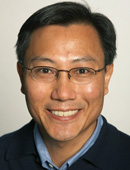Biography
Benjamin K. Chen, MD, PhD, is a Professor in the Division of Infectious Diseases, Department of Medicine, at the Icahn School of Medicine at Mount Sinai School of Medicine. He currently serves as the Irene and Dr. Arthur M. Fishberg Professor of Medicine, the Vice Chair for Research in the Department of Medicine and as an Associate Director for the Medical Scientist Training Program in the Icahn School of Medicine. He received his MD from Weill Medical College-Cornell University and his PhD at Rockefeller University studying human immunodeficiency virus type 1 (HIV-1) biology with the Nobel Laureate, Dr. David Baltimore. During his post doctoral fellowship at the Whitehead Institute for Biomedical Research with Dr. Peter S. Kim he studied HIV-1 assembly.
Benjamin Chen’s Laboratory studies the pathogenesis of HIV-1 infection and has revealed how cell-to-cell transmission of the virus contributes to disease. His group has used imaging approaches to uncover the formation of transmission-promoting structures called virological synapses. The images have revealed how the virus facilitates its spread by exploiting dynamic exchange of virus between cells. The lab has also revealed how the virological synapses promote immune evasion and allow the virus to maintain high genetic diversity. Recent studies have captured images of infected cells in living hosts measuring the influence of infected cells on the cell movements and interactions with uninfected recipient cells. These studies provide live images of the spread of HIV-1 within living immune tissues. The lab’s work on virological synapses contributes to the development of new drug, vaccine and microbicide approaches.
In The News
Transfer of HIV Between T Cells Captured on Video
Mount Sinai researchers and colleagues have for the first time captured on video the transfer of human immunodeficiency virus (HIV) from infected to uninfected T cells.
Find out more here
Benjamin K. Chen, MD, PhD, is a Professor in the Division of Infectious Diseases, Department of Medicine, at the Icahn School of Medicine at Mount Sinai School of Medicine. He currently serves as the Irene and Dr. Arthur M. Fishberg Professor of Medicine, the Vice Chair for Research in the Department of Medicine and as an Associate Director for the Medical Scientist Training Program in the Icahn School of Medicine. He received his MD from Weill Medical College-Cornell University and his PhD at Rockefeller University studying human immunodeficiency virus type 1 (HIV-1) biology with the Nobel Laureate, Dr. David Baltimore. During his post doctoral fellowship at the Whitehead Institute for Biomedical Research with Dr. Peter S. Kim he studied HIV-1 assembly.
Benjamin Chen’s Laboratory studies the pathogenesis of HIV-1 infection and has revealed how cell-to-cell transmission of the virus contributes to disease. His group has used imaging approaches to uncover the formation of transmission-promoting structures called virological synapses. The images have revealed how the virus facilitates its spread by exploiting dynamic exchange of virus between cells. The lab has also revealed how the virological synapses promote immune evasion and allow the virus to maintain high genetic diversity. Recent studies have captured images of infected cells in living hosts measuring the influence of infected cells on the cell movements and interactions with uninfected recipient cells. These studies provide live images of the spread of HIV-1 within living immune tissues. The lab’s work on virological synapses contributes to the development of new drug, vaccine and microbicide approaches.
In The News
Transfer of HIV Between T Cells Captured on Video
Mount Sinai researchers and colleagues have for the first time captured on video the transfer of human immunodeficiency virus (HIV) from infected to uninfected T cells.
Find out more here

